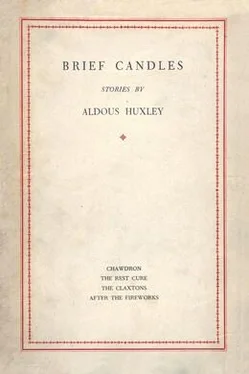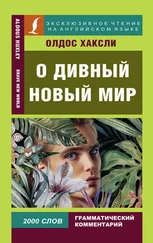‘Perfectly.’
‘You always did have a very discreditable respect for law and order and morality,’ he complained.
‘They must exist….’
‘I don’t know why,’ he interrupted me.
‘In order that you and I may be immoral in comfort,’ I explained. ‘Law and order exist to make the world safe for lawless and disorderly individualists.’
‘Not to mention ruffians like Chawdron. From whom, by the way, we seem to have wandered. Where was I?’
‘You’d just got to his providential introduction to the Fairy.’
‘Yes, yes. Well, as I said, she came, saw, conquered. Three days later she was installed in the house. He made her his librarian.’
‘ And his mistress, I suppose.’
Tilney raised his shoulders and threw out his hands in a questioning gesture. ‘Ah,’ he said, ‘that’s the question. There you’re touching the heart of the mystery.’
‘But you don’t mean to tell me … ’
‘I don’t mean to tell you anything, for the good reason that I don’t know. I only guess.’
‘And what do you guess?’
‘Sometimes one thing and sometimes another. The Fairy was genuinely enigmatic. None of poor Charlotte’s fabricated sphinxishness; a real mystery. With thee Fairy anything was possible.’
‘But not with Chawdron surely. In these matters, wasn’t he … well, all too human?’
‘No, only sub–human. Which is rather different. The Fairy roused in him all his sub–human spirituality and religiosity. Whereas with Charlotte it was the no less sub–human passion for the détournement de mineurs that came to the surface.’
I objected. ‘That’s too crude and schematic to be good psychology. Emotional states aren’t so definite and clear–cut as that. There isn’t one compartment for spirituality and another, water–tight, for the détournement de mineurs . There’s an overlapping, a fusion, a mixture.’
‘You’re probably right,’ said Tilney. ‘And, indeed, one of my conjectures was precisely of such a fusion. You know the sort of thing: discourses insensibly giving place to amorous action—though “action” seems too strong a word to describe what I have in mind. Something ever so softly senile and girlish. Positively spiritual contacts. The loves of the angels—so angelic that, when it was all over, one wouldn’t be quite sure whether there had been any interruption in the mystical conversation or not. Which would justify the Fairy in her righteous indignation when she heard of anyone’s venturing to suppose that she was anything more than Chawdron’s librarian. She could almost honestly believe she wasn’t. “I think people are too horrid,” she used to say to me on these occasions. “I think they’re simply disgusting. Can’t they even believe in the possibility of purity?” Angry she was, outraged, hurt. And the emotion seemed absolutely real. Which was such a rare occurrence in the Fairy’s life—at any rate, so it seemed to me—that I was forced to believe it had a genuine cause.’
‘Aren’t we all genuinely angry when we hear that our acquaintances say the same sort of things about us as we say about them?’
‘Of course; and the truer the gossip, the angrier we are. But the Fairy was angry because the gossip was untrue. She insisted on that—and insisted so genuinely (this is the point I was trying to make) that I couldn’t help believing she had some justification. Either nothing had happened, or else something so softly and slimily angelic that it slipped past the attention, escaped notice, counted for nothing.’
‘But after all,’ I protested, ‘it’s not because one looks truthful that one’s telling the truth.’
‘No. But then you didn’t know the Fairy. She hardly ever looked or sounded truthful. There was hardly anything she said that didn’t strike me as being in one way or another a manifest lie. So that when she did seem to be telling the truth (and it was incredible how rarely that happened), I was always impressed. I couldn’t help thinking there must be a reason. That’s why I attach such importance to the really heart–felt way she got angry when doubts were cast on the purity of her relations with Chawdron. I believe that they really were pure, or else, more probably, that the impurity was such a little one, so to speak, that she could honestly regard it as non–existent. You’d have had the same impression too, if you’d heard her. The genuineness of the anger, the outraged protest, was obvious. And then suddenly she remembered that she was a Christian, practically a saint; she’d start forgiving her enemies. “One’s sorry for them,” she’d say, “because they don’t know any better. Poor people! ignorant of all the finer feelings, all the more beautiful relationships.” I can’t tell you how awful the word “beautiful” was in her mouth! Really blood–curdling. Be–yütiful. Very long–drawn–out, with the oo sound thinned and refined into German u–modified. Be–yütiful. Ugh!’ He shuddered. ‘It made one want to kill her. But then the whole tone of these Christian sentiments made one want to kill her. When she forgave the poor misguided people who couldn’t see the be–yüty of her relations with Chawdron you were horrified, you felt sick, you went cold all over. For the whole thing was such a lie, so utterly and bottomlessly false. After the genuine anger against the scandalmongers, the falseness rang even falser than usual. Obvious, unmistakable, painful—like an untuned piano, like a cuckoo in June. Chawdron was deaf to it, of course; just didn’t hear the falseness. If you have a deep religious sense, I suppose you don’t notice those things. “I think she has the most beautiful character I’ve ever met with in a human being,” he used to tell me. (“Beautiful” again, you notice. Chawdron caught the trick from her. But in his mouth it was merely funny, not gruesome.) “The most beautiful character”—and then his beatific smile. Grotesque! It was just the same as with Charlotte; he swallowed her whole. Charlotte played the jolly kitten and he accepted her as the jolly kitten. The Fairy’s ambition was to be regarded as a sanctified Christian kitten; and duly, as a Christian kitten, a confirmed, communicant, Catholic, canonized Kitten, he did regard her. Incredible; but, there! if you spend all your wits and energies knowing about oil, you can’t be expected to know much about anything else. You can’t be expected to know the difference between tarantulas and kittens, for example; nor the difference between St Catherine of Siena and a little liar like Maggie Spindell.’
‘But did she know she was lying?’ I asked. ‘Was she consciously a hypocrite?’
Tilney repeated his gesture of uncertainty. ‘ Chi lo sa? ’ he said. ‘That’s the finally unanswerable question. It takes us back to where we were just now with Chawdron—to the borderland between biography and autobiography. Which is more real: you as you see yourself, or you as others see you? you in your intentions and motives, or you in the product of your intentions? you in your actions, or you in the results of your actions? And anyhow, what are your intentions and motives? And who is the “you” who has intentions? So that when you ask if the Fairy was a conscious liar and hypocrite, I just have to say that I don’t know. Nobody knows. Not even the Fairy herself. For, after all, there were several Fairies. There was one that wanted to be fed and looked after and given money and perhaps married one day, if Chawdron’s wife happened to die.’
‘I didn’t know he had a wife,’ I interrupted in some astonishment.
‘Mad,’ Tilney telegraphically explained. ‘Been in an asylum for the last twenty–five years. I’d have gone mad too, if I’d been married to Chawdron. But that didn’t prevent the Fairy from aspiring to be the second Mrs C. Money is always money. Well, there was that Fairy—the adventuress, the Darwinian specimen struggling for existence. But there was also a Fairy that genuinely wanted to be Christian and saintly. A spiritual Fairy. And if the spirituality happened to pay with tired businessmen like Chawdron—well, obviously, tant mieux .’
Читать дальше



![Олдос Хаксли - О дивный новый мир [Прекрасный новый мир]](/books/11834/oldos-haksli-o-divnyj-novyj-mir-prekrasnyj-novyj-thumb.webp)






